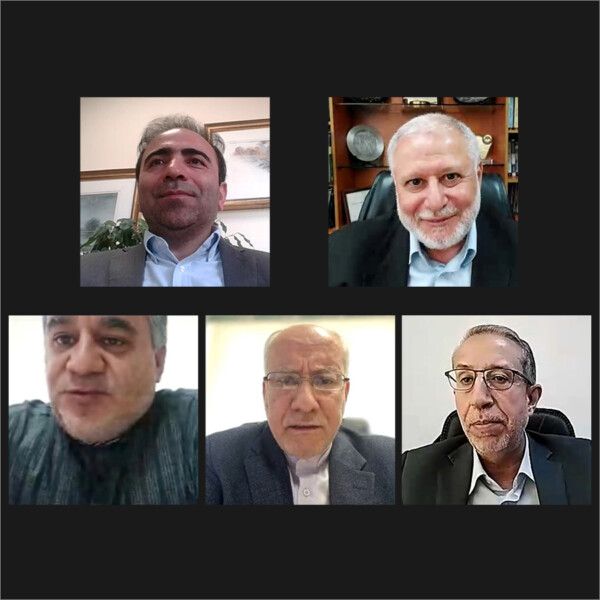Al-Zaytouna Centre for Studies and Consultations in Beirut, in collaboration with the Institute for Political and International Studies (IPIS) in Iran, held a Skype seminar titled “Commemoration of Operation al-Aqsa Flood: Future Prospects for Regional Security and Palestine” on Tuesday, 3/9/2024.
The seminar was attended by Dr. Khalil Shirgholami, General-Manager of IPIS; Prof. Dr. Mohsen Mohammad Saleh, General-Manager of Al-Zaytouna Centre for Studies and Consultations; Hamid Bayat, Iran’s former ambassador to Italy and former Director General of the MENA Affairs Dept. at Iran’s Ministry of Foreign Affairs; ‘Atef al-Joulani, Editor-in-Chief of Assabeel newspaper and expert in political and strategic affairs; Mojtaba Ferdosipour, Iran’s former ambassador to Jordan; Mohammad Reza Shibani, Iran’s former ambassador to Lebanon; and a number of other experts and specialists.
The seminar was inaugurated by Dr. Khalil Shirgholami, who discussed the emergence of new actors, institutions and concepts in international politics. He highlighted two major crises in response to the rapid changes in the global system: the normative collapse of the international order and a humanitarian crisis. Shirgholami noted that the Zionist regime is actively undermining the three fundamental elements required for the establishment of a Palestinian state—land, population and sovereignty. He further emphasized that the events following 7/10/2023 have revitalized the Palestine issue, which had previously been neglected even within the Muslim world.
Hamid Bayat remarked that the perception of the Palestine issue has shifted since 7/10/2023. He noted that this war has led to increased global criticism of Israel and greater support for Palestine. Bayat highlighted that the resistance has demonstrated its potential to be a decisive factor in the current regional dynamics. He also addressed the significant internal, regional and international challenges facing Israel, as well as Iran’s regional policy. Bayat emphasized that Iran, as a key geopolitical player, has no interest in escalating the conflict into a full-scale war. Additionally, he discussed the international stance on Middle Eastern developments, including the positions of the US, Europe, Russia and China.
‘Atef al-Joulani described Operation al-Aqsa Flood as the longest war in the history of the Arab-Israeli conflict, with profound implications for the region’s political and security dynamics. He highlighted its impact on neighboring countries (Jordan, Egypt, Syria and Lebanon) including: The increased fears of forced displacement towards Egypt and Jordan, a resurgence of the alternative homeland project; concerns over the potential decline or collapse of the Palestinian Authority in favor of Islamic resistance. Additionally, there are rising Israeli apprehensions about the Lebanese front as a security threat, while the relatively limited involvement of the Syrian front offers some relief to Israel. The war has intensified tensions in Egyptian-Israeli relations due to Gaza’s security threat to Egypt and has raised worries among Egypt, Jordan and some Gulf states that the war may enhance Iran’s influence in the Arab region.
Al-Joulani discussed future prospects, noting that increased concerns over Iran’s growing influence in the region are likely to drive many Arab countries closer to the US stance and impact the normalization process in all its aspects. He suggested that the US might reassess its pre-Operation al-Aqsa Flood strategy of minimizing intervention in the Arab region. He also indicated that the ongoing war could evolve into a protracted war of attrition, requiring resistance forces and their supporters to develop a strategic plan to address this prolonged scenario.
Mojtaba Ferdosipour argued for the establishment of a united front and a joint operations unit to encircle Zionist entity and broaden the scope of resistance operations across land, sea and air. He emphasized the need for the resistance to reform diplomatic strategies, advance in artificial intelligence, and leverage the Z and Alpha generations as well as virtual space. Ferdosipour also noted that the escalating situation within Israel represents a significant opportunity, and he stressed the importance of a thorough assessment of international institutions’ roles following the Gaza war.
Prof. Dr. Mohsen Mohammed Saleh stated that Operation al-Aqsa Flood demonstrated the vulnerability of the Zionist project. It challenged the Israeli security theory upon which the state was established and undermined the concept of Palestine as a secure refuge for Jews, which is foundational to the state’s ideology.
The operation also questioned the role of the region’s enforcer, who serves Western colonial interests and acts as a regional power. It undermined the notion of normalization in Arab countries. Saleh noted that Israel is now facing an existential challenge and that regional security, as defined by Israeli-US theory, has been fundamentally shaken. He emphasized that the US is not a neutral mediator but an active partner in the war, providing political, media, financial and military support to Israel. Disrupting the Israeli security system, he argued, is tantamount to disrupting the US security system and undermining its influence in the region.
Saleh emphasized the crucial role of the axis of resistance in Operation al-Aqsa Flood, highlighting the military contributions of Hizbullah in Lebanon, Ansar Allah (Houthis) in Yemen, and Iran’s political and logistical support as a significant regional power. He noted that while the war could potentially continue, such a scenario would be disastrous for Israel, which would struggle to bear the associated costs, thereby benefiting the resistance if it can endure. Saleh also stated that neither Israeli nor US interests or desires are aligned with a regional war. However, should tensions escalate, the primary loser would be Israel, and ongoing war would exacerbate internal crises and popular movements in countries that normalize relations with, or submit to, US influence and hegemony.
The seminar concluded with significant insights and feedback from a panel of experts and specialists.





Leave A Comment